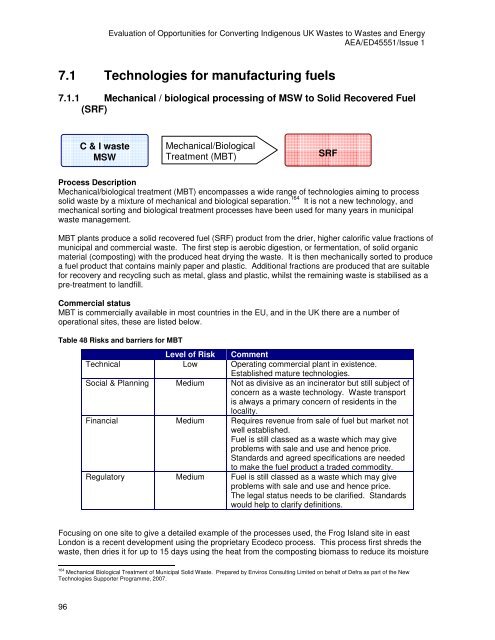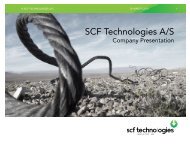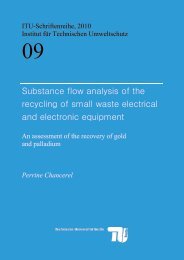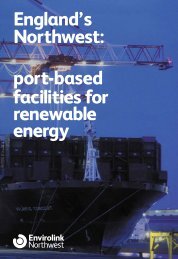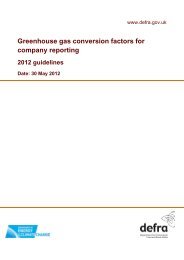to read the full report - Ecolateral by Peter Jones
to read the full report - Ecolateral by Peter Jones
to read the full report - Ecolateral by Peter Jones
You also want an ePaper? Increase the reach of your titles
YUMPU automatically turns print PDFs into web optimized ePapers that Google loves.
96<br />
Evaluation of Opportunities for Converting Indigenous UK Wastes <strong>to</strong> Wastes and Energy<br />
AEA/ED45551/Issue 1<br />
7.1 Technologies for manufacturing fuels<br />
7.1.1 Mechanical / biological processing of MSW <strong>to</strong> Solid Recovered Fuel<br />
(SRF)<br />
C & I waste<br />
MSW<br />
Process Description<br />
Mechanical/biological treatment (MBT) encompasses a wide range of technologies aiming <strong>to</strong> process<br />
solid waste <strong>by</strong> a mixture of mechanical and biological separation. 164 It is not a new technology, and<br />
mechanical sorting and biological treatment processes have been used for many years in municipal<br />
waste management.<br />
MBT plants produce a solid recovered fuel (SRF) product from <strong>the</strong> drier, higher calorific value fractions of<br />
municipal and commercial waste. The first step is aerobic digestion, or fermentation, of solid organic<br />
material (composting) with <strong>the</strong> produced heat drying <strong>the</strong> waste. It is <strong>the</strong>n mechanically sorted <strong>to</strong> produce<br />
a fuel product that contains mainly paper and plastic. Additional fractions are produced that are suitable<br />
for recovery and recycling such as metal, glass and plastic, whilst <strong>the</strong> remaining waste is stabilised as a<br />
pre-treatment <strong>to</strong> landfill.<br />
Commercial status<br />
MBT is commercially available in most countries in <strong>the</strong> EU, and in <strong>the</strong> UK <strong>the</strong>re are a number of<br />
operational sites, <strong>the</strong>se are listed below.<br />
Table 48 Risks and barriers for MBT<br />
Level of Risk Comment<br />
Technical Low Operating commercial plant in existence.<br />
Established mature technologies.<br />
Social & Planning Medium Not as divisive as an incinera<strong>to</strong>r but still subject of<br />
concern as a waste technology. Waste transport<br />
is always a primary concern of residents in <strong>the</strong><br />
locality.<br />
Financial Medium Requires revenue from sale of fuel but market not<br />
well established.<br />
Fuel is still classed as a waste which may give<br />
problems with sale and use and hence price.<br />
Standards and agreed specifications are needed<br />
<strong>to</strong> make <strong>the</strong> fuel product a traded commodity.<br />
Regula<strong>to</strong>ry Medium Fuel is still classed as a waste which may give<br />
problems with sale and use and hence price.<br />
The legal status needs <strong>to</strong> be clarified. Standards<br />
would help <strong>to</strong> clarify definitions.<br />
Focusing on one site <strong>to</strong> give a detailed example of <strong>the</strong> processes used, <strong>the</strong> Frog Island site in east<br />
London is a recent development using <strong>the</strong> proprietary Ecodeco process. This process first shreds <strong>the</strong><br />
waste, <strong>the</strong>n dries it for up <strong>to</strong> 15 days using <strong>the</strong> heat from <strong>the</strong> composting biomass <strong>to</strong> reduce its moisture<br />
164 Mechanical Biological Treatment of Municipal Solid Waste. Prepared <strong>by</strong> Enviros Consulting Limited on behalf of Defra as part of <strong>the</strong> New<br />
Technologies Supporter Programme, 2007.<br />
Mechanical/Biological<br />
Treatment (MBT)<br />
SRF


